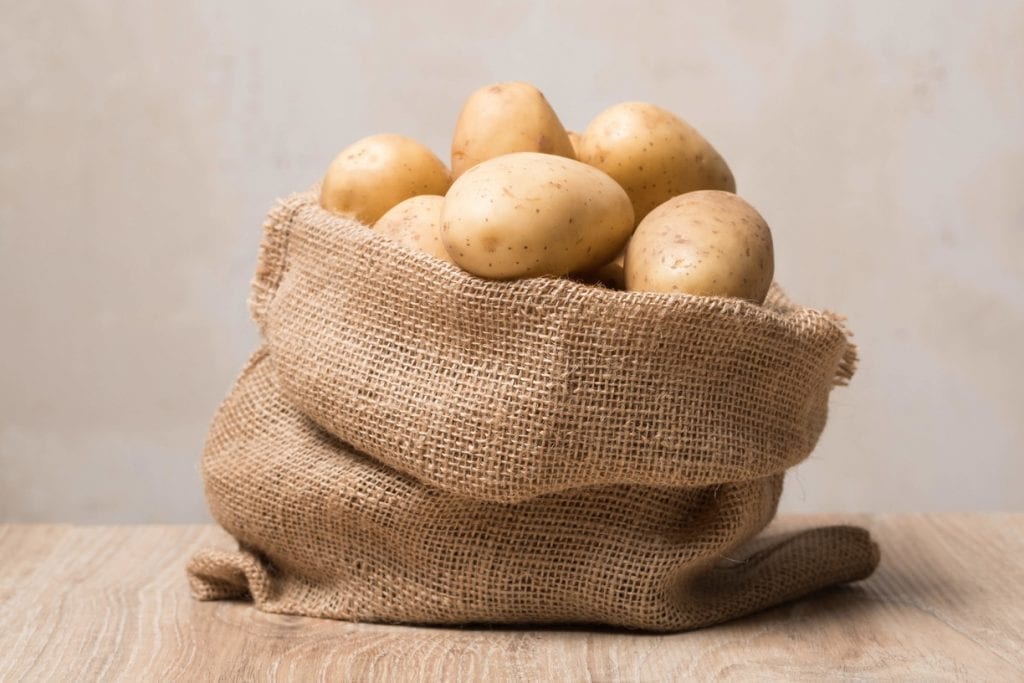
There’s a stockpile of potatoes sitting on your kitchen counter from your recent harvest or perhaps bags of potatoes that you bought at the farmers market last weekend. Now you’re worried that they’re more than enough and a lot of them will go to waste. So now you’re asking: How long do potatoes last?
Potatoes are actually one of those veggies with a long shelf life. However, proper storage is still very much important when you have this produce at home. Here, we’ll give you an idea of how long potatoes last, depending on the variety and whether they’re raw or cooked. Plus, we’ll show you how to store potatoes long-term so you can still make the best of them in the future.
How Long Do Potatoes Last?
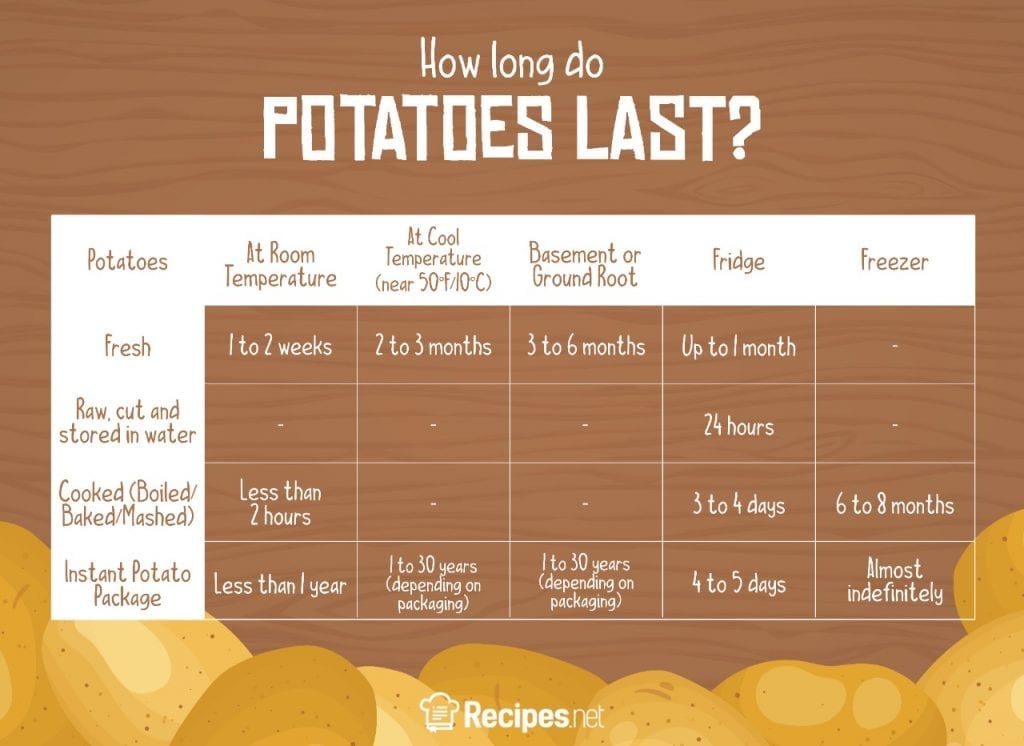
How long are potatoes good for? Their shelf life basically depends on several factors such as the types of potatoes or whether they’re raw, cooked, or frozen. And of course, we should also consider the environment, humidity, or how they’re stored.
At Room Temperature
There are a few things you should remember when storing these produce at room temperature. Make sure they sit out of light and the place is well-ventilated. Moreover, don’t rinse off the dirt when storing them as they will last longer if you keep them dry. If properly stored at room temperature, fresh spuds can last up to two weeks.
If you have a pantry, these starchy veggies can keep for three to five weeks. Other great alternatives are the in-ground root cellar and the basement. Because of the dark and cool environment, spuds can last for three to six months.
But if you wish to store these produce even longer, you can choose to keep them in the fridge or freeze them. Luckily for you, we’ll be giving some of the best storing tips on how to keep these starchy veggies fresh. So read on and make sure to use the finest spuds when you whip up a buttery and creamy appetizer with our colcannon recipe.
Refrigerated
Raw Potatoes
How long do potatoes last in the fridge? Fresh spuds can be stored in the fridge for up to a month but their flavor and texture may change. It can increase their sugar content at a great rate and they’ll probably taste a bit sweet when cooked.
However, there are instances when you can’t find a proper place to store this produce. If that’s the case, just ensure that they’re placed in proper containers before putting them in the fridge. If you need to store raw potatoes for only 24 hours, it’s best to cut them, submerge them in cold water, and keep them in the fridge. These sliced ones are perfect if you’re up for cheesy baked potato wedges the following day.
Cooked Potatoes
If you’ve had a barbeque party and made plenty of potatoes on a pellet grill with enough for leftovers, you might also be wondering: How long do cooked potatoes last in the fridge? Or is it okay to store your leftover mashed potatoes in the fridge? While a fresh spud is discouraged to be stored in the fridge, it’s actually best to refrigerate them if they’re cooked.
Just keep in mind to store them in a tightly sealed container. How long do cooked potatoes last in the fridge? If stored correctly, they can last for a week in the fridge.
Frozen
Raw Potatoes
Can you freeze raw potatoes, you might ask. Well, as much as possible, it’s not advisable to freeze fresh spuds. However, if you don’t have any choice but to freeze them, there are some things you should keep in mind. Spuds may discolor and their texture might change when kept in the freezer. So what you can do is partially cook or blanch them first before freezing.
Here are four easy steps on freezing raw potatoes:
- First, wash and peel the potatoes, cut them to your desired size or shape.
- Blanch them quickly in boiling water.
- Place them in a bowl of ice water, then carefully drain them.
- Finally, put your spuds in an airtight container or a freezer-safe bag before freezing. If frozen correctly, they can last up to twelve months.
It’s important that you thaw frozen spuds in the fridge before making them into delicious creamy mashed potatoes. Now, this recipe may call for sour cream. Chances are there will be leftover sour cream as well. This brings up the question: Can you freeze sour cream? Well, yes! Just like potatoes, sour cream also needs to be stored properly so it lasts longer.
Cooked Potatoes
Cooked potatoes, on the other hand, can be frozen. Place your leftover mashed potatoes, crispy french fries, or baked potatoes inside an airtight container and they’ll be good for six to eight months. Leftover recipes can be handy, so keep a list of your favorite ones and make the most of what you’re cooking. We’re loving these cheesy mashed potato patties that you can make with leftover mashed potatoes in just 30 minutes!
How To Store Potatoes in 5 Easy Ways
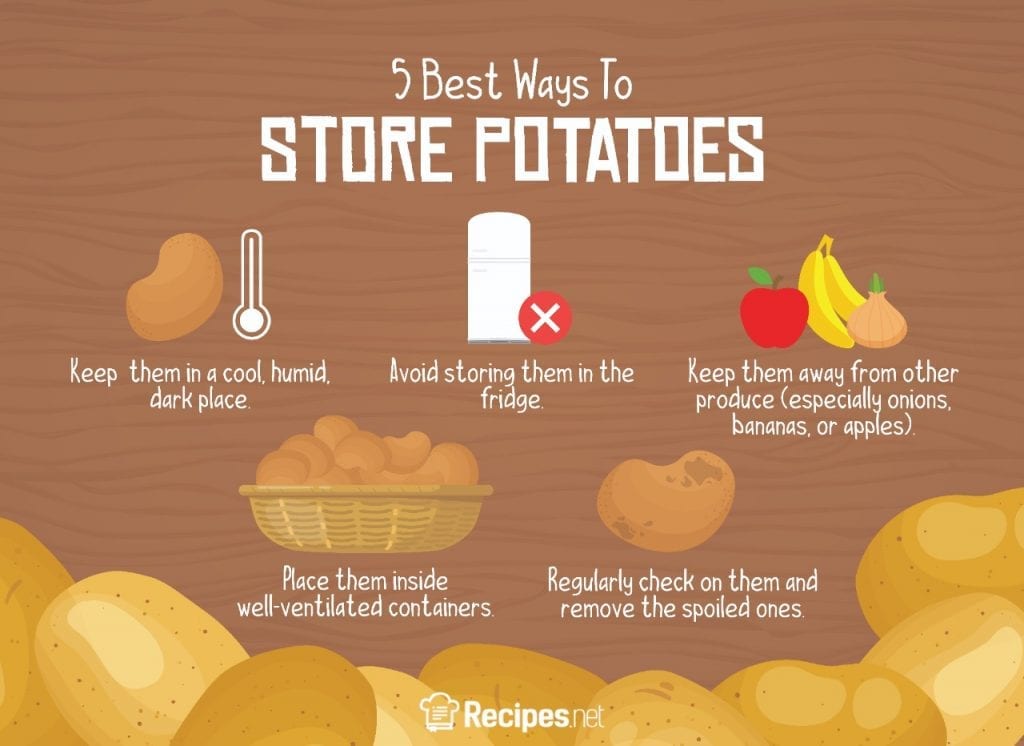
Potatoes typically have a long shelf life. However, that can also depend on the storage process. How you store them or any produce can actually make a huge difference. It might help them last longer or may delay spoilage. Let us show you the best ways to store these starchy vegetables so they stay nice, fresh, and last longer!
Keep potatoes in a cool, humid, dark place.
Provide the right environment. The ideal temperature for storing potatoes is between 45 to 50 degrees F. Also consider main factors such as temperature, humidity, and light.
Ideally, it’s best to store them in a cool, dry, dark place such as your cupboard and pantry. They’ll probably last for about three to five weeks. Another great option is to place them in your basement as long as it’s well-ventilated and dry. Minimize exposure to light, be it natural or artificial, as they may develop green spots.
Avoid storing potatoes in the fridge.
We don’t recommend keeping potatoes in the refrigerator. As stated before, the extra-cool temperature shortens their shelf life and converts the vegetable’s starch into sugar as well. Moreover, storing them in the fridge can be potentially harmful to your health.
Keep them away from onions, bananas, or apples.
Another helpful tip on how to preserve spuds is by avoiding storing them near onions, bananas, and apples. Although potatoes and onion storage processes are somehow similar, they shouldn’t be kept in one place. These produce release high levels of ethylene gas, a ripening agent, which of course can cause premature ripening. Store them in separate storage boxes and remember to keep your spuds solo.
Place the potatoes inside a breathable container.
Ideally, fresh spuds should be put in a container that will allow them to breathe. Airtight containers and plastic bags are not great options as they can create a damp environment and shorten the shelf life of these veggies. You can also store potatoes in a fruit bowl to keep them fresh. But remember to keep potatoes away from ethylene potent fruits and veggies to keep them from sprouting.
Canning potatoes is yet another way to preserve them. Here are four easy steps on how to can potatoes:
- Begin by washing and peeling the spuds. Then cut them to your desired sizes.
- Next, prepare the jars you’ll be using and blanch the spuds before the canning.
- Fill the jars with partially cooked potatoes. Pour boiling filtered water into the jars and make sure to leave one inch of headspace.
- Finally, gently place the jars in the pressure canner. Make sure to follow your pressure canner’s instruction manual when canning your potatoes.
Canned potatoes are absolutely convenient as they’re faster to prepare. Store them in a cool location and they can last up to a year! It’s best that you consume home-canned potatoes within 12 to 18 months.
Regularly check on your potatoes.
It’s important that you frequently check on your spuds to check the quality. Immediately remove those that have been showing telltale signs of spoilage to prevent the others from going bad as well. And use only the good ones for your twice-baked potatoes.
How to Tell if Potatoes Are Bad or Spoiled
As we’ve mentioned earlier, this starchy produce has a long shelf life. However, it’s also good to know if they’ve been showing indications of spoilage. How long do they last before they go bad? This vegetable goes through several changes in its appearance and smell before it rots. So the question is: When do potatoes go bad? Here’s how you would know if their quality is deteriorating:
Wrinkly Surface
Fresh spuds are firm and free of any bruises or blemishes. However, as they start to age, there are signs of spoilage that are noticeable enough. The surface or skin wrinkles or sags and becomes mushy. If that’s the case, it’s best to throw wrinkly and mushy potatoes away as they might contaminate the fresh ones, not to mention they’d be inedible.
Molds
These veggies should be stored properly as mold begins to grow on the surface when they’re exposed to high humidity. If that happens, you should check first the other areas of mold or if the molds have already reached the insides of the potatoes. If they’re growing multiple molds, then they’re no longer pleasant to eat. It’s best to discard them.
Sour or Musty Scent
Fresh spuds normally have an earthy smell. And old ones will have a musty or moldy odor—the smell of spoiled potatoes. Even though they look fine on the outside or there aren’t wrinkles on the surface, once it starts to smell foul, get rid of them already as they’re no longer edible.
Can You Eat Potatoes With Sprouts?
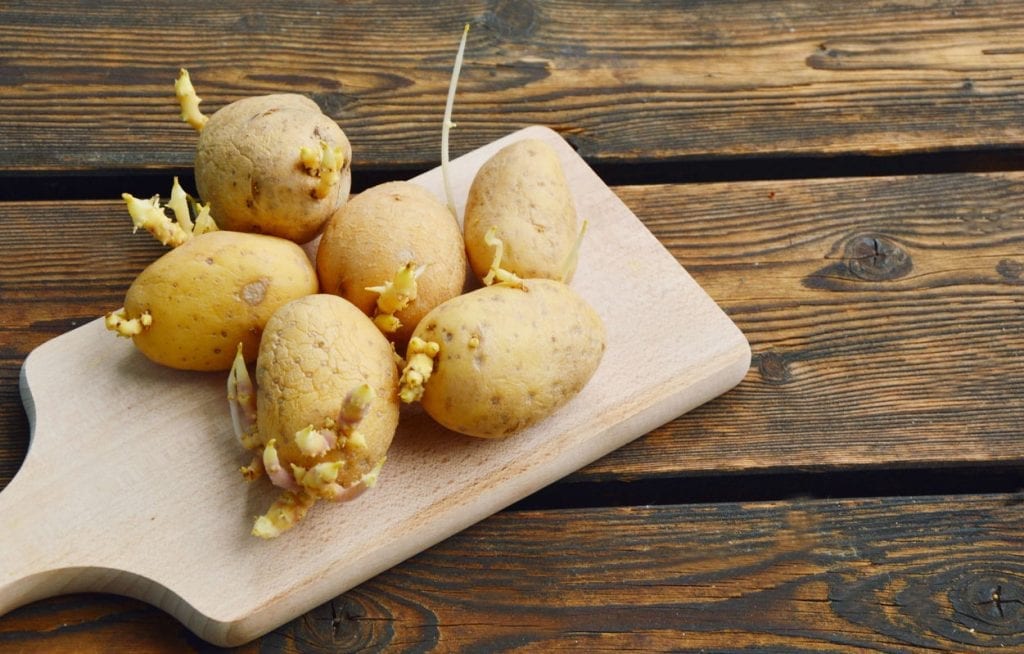
Is it okay to eat potatoes with sprouts? Yes, they’re still safe if and only if the sprouts are removed. If you decide to still make use of these sprouted potatoes, don’t forget to cut off the sprouts before making the crowd-favorite loaded french fries.
However, you should consider their texture and surface as well. Are they still firm to the touch? Are they too wrinkly or sagging? Now, if they’re too soft, too wrinkly, and have several sprouts, it’s better to dispose of them.
Harmful compounds such as solanine and chaconine are found in potato plants, specifically in the sprouts and skins of tubers. And if consumed in excessive amounts, it may cause headaches, vomiting, and diarrhea. To prevent these taters from growing sprouts, avoid storing them in warmer temperatures.
The good news is, you can still make use of sprouted potatoes especially if you’re into gardening. Simply plant the sprouting potato in a roomy container or a paper bag filled with potting soil. Set them out in your home garden, and in three months, new spuds will start to grow.
Can You Eat Green Potatoes?
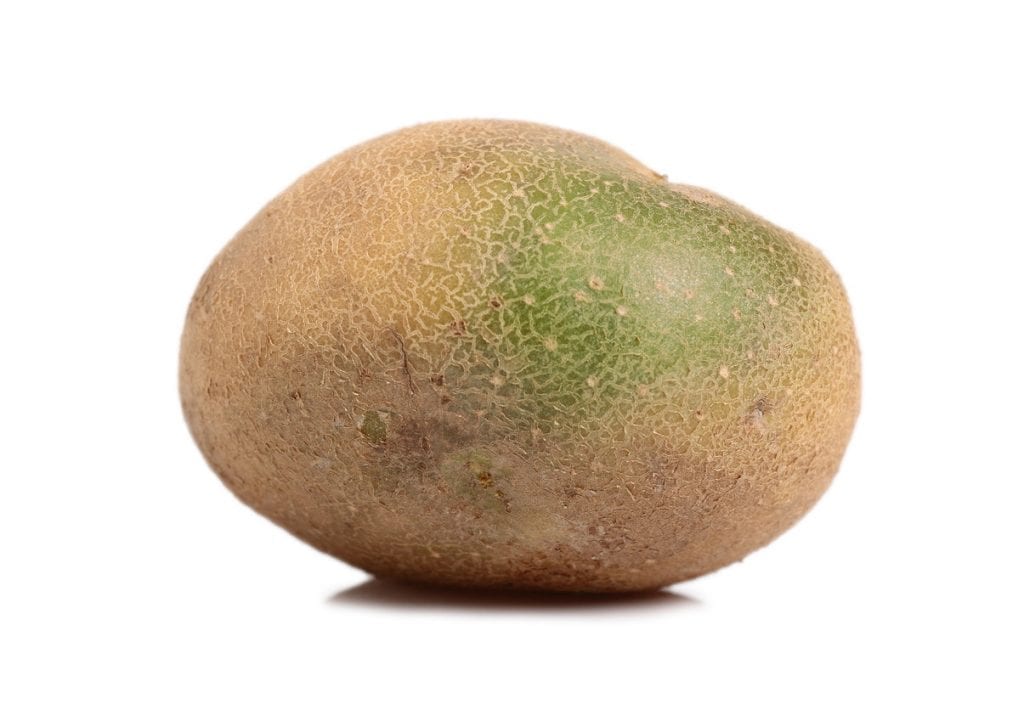
When exposed to light, spuds may undergo discoloration and develop a green tinge. Those green spots, like the sprouts, contain glycoalkaloid known as solanine. It’s a neurotoxin and may cause nausea and headaches when consumed.
But no worries as they’re still safe to eat. Simply peel away the green areas to destroy the solanine toxin and to prevent a bitter taste. Once the green tinge is removed, you can already make a creamy sweet potato casserole for you to share with your family. However, if you notice extreme discoloration in them, we recommend that you throw them away. To avoid such risks, properly storing these vegetables is highly advised.
Can You Eat Soft Potatoes?
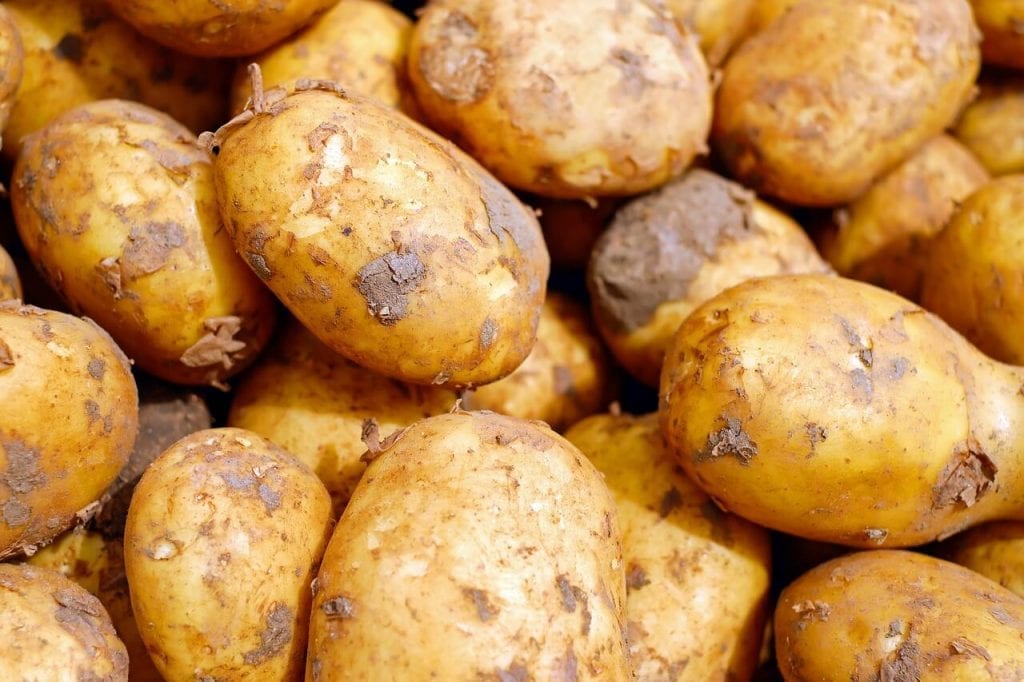
While those with sprouts and green tinges can be safe to a certain extent, it’s best to discard mushy and soft ones. Ideally, they should be firm to the touch. And when it becomes too mushy, it’s actually an indication that they’re turning bad.
But if you don’t see any sign of mold, you can safely turn them into mashed potatoes or crispy hash browns.
Now that you know how long potatoes last and how to keep them fresh…
You no longer have to worry about stockpiles of it resting in your kitchen. Proper storage extends their shelf life and keeps them fresh. Good food storage practices reduce food waste and keep you safe from food-borne illnesses and food poisoning. All the more reason for you to follow our easy storage tips to keep your potatoes fresh and keep you safe and healthy.
Was this page helpful?
Read Next: Can You Freeze Celery? Yes, Here’s How.











